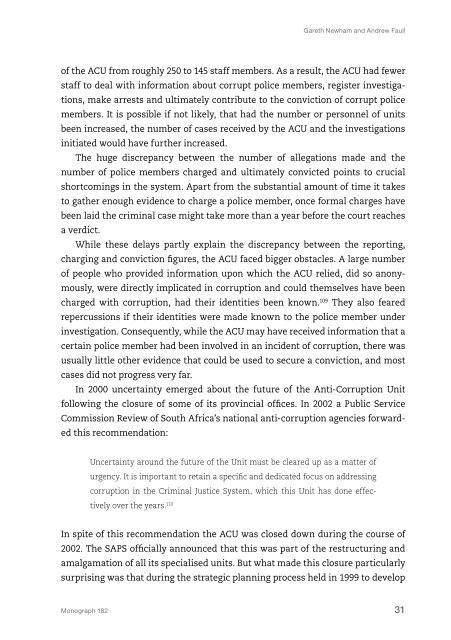Protector or predator? - Institute for Security Studies
Protector or predator? - Institute for Security Studies
Protector or predator? - Institute for Security Studies
Create successful ePaper yourself
Turn your PDF publications into a flip-book with our unique Google optimized e-Paper software.
Gareth Newham and Andrew Faull<br />
of the ACU from roughly 250 to 145 staff members. As a result, the ACU had fewer<br />
staff to deal with inf<strong>or</strong>mation about c<strong>or</strong>rupt police members, register investigations,<br />
make arrests and ultimately contribute to the conviction of c<strong>or</strong>rupt police<br />
members. It is possible if not likely, that had the number <strong>or</strong> personnel of units<br />
been increased, the number of cases received by the ACU and the investigations<br />
initiated would have further increased.<br />
The huge discrepancy between the number of allegations made and the<br />
number of police members charged and ultimately convicted points to crucial<br />
sh<strong>or</strong>tcomings in the system. Apart from the substantial amount of time it takes<br />
to gather enough evidence to charge a police member, once f<strong>or</strong>mal charges have<br />
been laid the criminal case might take m<strong>or</strong>e than a year bef<strong>or</strong>e the court reaches<br />
a verdict.<br />
While these delays partly explain the discrepancy between the rep<strong>or</strong>ting,<br />
charging and conviction figures, the ACU faced bigger obstacles. A large number<br />
of people who provided inf<strong>or</strong>mation upon which the ACU relied, did so anonymously,<br />
were directly implicated in c<strong>or</strong>ruption and could themselves have been<br />
charged with c<strong>or</strong>ruption, had their identities been known. 109 They also feared<br />
repercussions if their identities were made known to the police member under<br />
investigation. Consequently, while the ACU may have received inf<strong>or</strong>mation that a<br />
certain police member had been involved in an incident of c<strong>or</strong>ruption, there was<br />
usually little other evidence that could be used to secure a conviction, and most<br />
cases did not progress very far.<br />
In 2000 uncertainty emerged about the future of the Anti-C<strong>or</strong>ruption Unit<br />
following the closure of some of its provincial offices. In 2002 a Public Service<br />
Commission Review of South Africa’s national anti-c<strong>or</strong>ruption agencies f<strong>or</strong>warded<br />
this recommendation:<br />
Uncertainty around the future of the Unit must be cleared up as a matter of<br />
urgency. It is imp<strong>or</strong>tant to retain a specific and dedicated focus on addressing<br />
c<strong>or</strong>ruption in the Criminal Justice System, which this Unit has done effectively<br />
over the years. 110<br />
In spite of this recommendation the ACU was closed down during the course of<br />
2002. The SAPS officially announced that this was part of the restructuring and<br />
amalgamation of all its specialised units. But what made this closure particularly<br />
surprising was that during the strategic planning process held in 1999 to develop<br />
Monograph 182 31

















